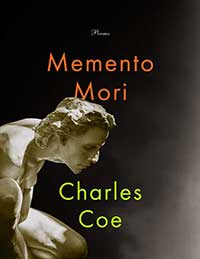 *
*
I ran into Somerville-area poet Charles Coe at the Cambridge Public Library the other day. He is a man about my age, who was roaming the space with his signature causal gait, taking in the whole scene. I didn’t see him hooked to the usual digital hardware, no texting finger dances … he was there … in the moment. As fate would have it, he gave me his new collection of poetry Memento Mori. It starts out with a quote by Marcus Aurelius, “Use your numbered days to throw open the windows of your soul to the sun. If you do not, the sun will soon set, and you with it.”

Memento Mori: Poems by Charles CoeLEAPFROG PRESS$15.00
Coe, an accomplished writer in his sixties and holding, marks the passage of time and accepts it. He has conversations with his brash younger self – the shadow of death and the joys of life are in close proximity. He appreciates the simple beauty around him – he is forgiving – he remembers grudges, but they take on different dimensions. He often laughs at us, but just as easily laughs at himself.
I was touched by his piece Poem for an Absent Friend. The poet is in the Boston Commons with a friend who has a grim diagnosis of cancer. And it seems that the Commons in my life, and I am sure others, has often been a stage for any number of dramas. In these three stanzas, Cole populates his poem with “things,” that infuse it with deep layers of meaning,
“So we walk across the Common
past pigeons pecking in the grass,
that scatter before the lion-hearted toddler’s
charge, past the piper who whose ancient call to battle
bounces unheeded off the blank faces
of high-rise condos, past beautiful young women
in spring finery who will offer their bodies
as gifts for someone else to unwrap
and your taking it all in on this farewell
tour of the world, taking it in and letting it go.
A young couple near the fountain holds a baby.
An older woman with a camera clicks the shutter
as we pass and we are captured in a frame.
Perhaps 100 years from now
someone flipping through a dusty scrapbook
will pause a moment to contemplate our faded images,
tow ancient and mysterious ghosts…”
Coe also has a fair number of haiku in this collection, and one in particular made me think twice before I petted my beloved feline…
“if i were bigger
i would be licking your bones
sweet and gleaming white.”
Coe’s poetry is peppered with humor, and wry observation. He is a walker in the city, a flaneur, taking in the blues, a long lost dive bar, and the finery and scent of young women now out of his reach. Like the great photographer Walker Evans, he stalks the subway – he takes it all in, and knows one day he will have to let it go.















Reader Comments